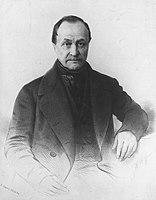
Photo from wikipedia
How can you know something that cannot be seen, heard, tasted, touched or smelled? The question applies most obviously to things like rights, justice or freedom because they do not… Click to show full abstract
How can you know something that cannot be seen, heard, tasted, touched or smelled? The question applies most obviously to things like rights, justice or freedom because they do not seem be as easy to locate or describe as things that can be known by the senses. Part of the point of positivism was that under certain conditions they can. To Auguste Comte (1798–1857), the movement's founder, it was possible to have as positive a knowledge of rights, justice or freedom as whatever was needed to know a cat or a mat. Positivism could, therefore, have as much to do with morality as with epistemology and as strong a concern with values and beliefs as with facts and certainty. The resulting capacity to move seamlessly between the external and the internal and from the physical to the moral was one reason why, together with the word “sociology,” the other word that came to be associated most widely and durably with positivism was another of Comte's coinages, “altruism.” Positivism, in short, was the science—or knowledge—of altruism.
Journal Title: Modern Intellectual History
Year Published: 2021
Link to full text (if available)
Share on Social Media: Sign Up to like & get
recommendations!